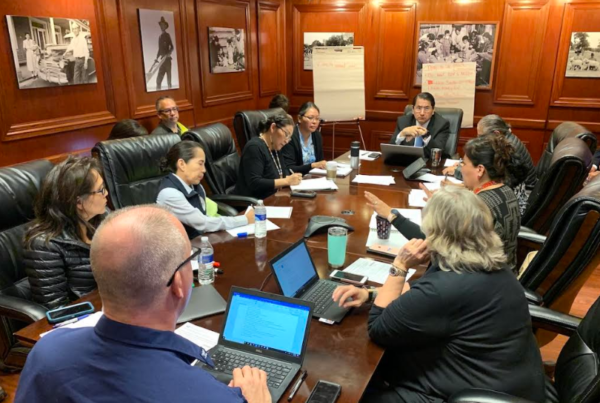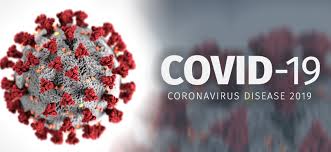
- Details
- By Press Releases
From Press Release
WINDOW ROCK, Ariz. — On Tuesday, Navajo Nation President Jonathan Nez and Vice President Myron Lizer issued a travel advisory for all Navajo Nation Executive Branch employees and continued to caution members of the Navajo Nation in response to growing concerns over the spread of the COVID-19 virus in several states and countries around the world.
As of Wednesday, there are no confirmed cases of the COVID-19 virus on the Navajo Nation.
On Feb. 27, the Nez-Lizer Administration established the Navajo Nation COVID-19 Preparedness Team to monitor, plan, prepare, and coordinate precautionary efforts to address the COVID-19 virus. The Team includes the Navajo Department of Health, Navajo Nation Division of Public Safety, Navajo Nation Division of Social Services, Navajo Nation Department of Emergency Management, Department of Diné Education, Navajo Nation Division of Community Development, U.S. Indian Health Service, U.S. Bureau of Indian Affairs, and the U.S. Bureau of Indian Education.

“We advise all of our employees and Navajo citizens to limit their travel to other states and internationally for the time being. Our administration is taking proactive measures to continue raising public awareness and to plan and prepare for the potential spread of COVID-19 virus in our region. The provisions outlined in the travel advisory are intended to raise awareness, to educate our Navajo people, and not to create unnecessary hysteria,” said President Nez.
In a memorandum addressed to Executive Branch employees, President Nez and Vice President Lizer direct allDivisions, Departments, and Programs under the Executive Branch to limit work-related travel due the growing concerns over the COVID-19 virus.
“We implore all Division Directors to use their best discretion to limit unnecessary travel for Navajo Nation employees. Division Directors will determine whether travel requests for their employees are “essential travel” on a case-by-case basis in order to reduce risks. All Division Directors are required to obtain approval from the Office of the President and Vice President for their work-related travel requests,” the memorandum states.
For employees, President Nez and Vice President Lizer also recommend the following:
- Attending meetings/events/training by using teleconference calls/video rather than traveling off the Navajo Nation
- Staying home or working from home if you have symptoms such as fever, coughing, shortness of breath, difficulty breathing
- Avoiding contact with people showing illness or symptoms
- Cleaning/sanitizing your workstation/office space routinely
Health care officials also advise that if a person has shortness of breath or has difficulty breathing, to report to your local physician and/or emergency room hospital and to call ahead to allow the facility to prepare for your arrival.
“It is incumbent upon us, as individuals, to take precautionary measures including washing your hands frequently, staying home when sick, avoiding contact with those who are sick, and limiting travel to reduce the spread of germs and decrease exposure risk,” stated President Nez.
On Tuesday, President Nez also met with the Navajo Nation COVID-19 Preparedness Team and first responders to coordinate their response and outreach efforts and to offer support for their preparedness efforts as well. Through the Navajo Health Education Program, over 78,000 members of the Navajo Nation received educational and preventative information related to the COVID-19 virus. Community Health Representatives also continue to inform elderly and disabled clients during their routine home visits.
On Thursday, March 5 from 6:00 p.m. to 8:00 p.m. the Nez-Lizer Administration will host a second live radio forum on KTNN 660AM to provide more information to the Navajo public and to receive questions from the public. Requests for the Navajo Nation Department of Health to provide information/presentations regarding the COVID-19 virus and preparation efforts can be e-mailed to [email protected].
The Nez-Lizer Administration will continue to coordinate with the county, state, and federal officials to monitor the evolving impacts of the coronavirus and continue to encourage the public to take precautions. For updates, please visit the Centers for Disease Control and Prevention at https://www.cdc.gov/coronavirus/2019-ncov/index.html.
More Stories Like This
Native News Weekly (August 25, 2024): D.C. BriefsUS Presidents in Their Own Words Concerning American Indians
Native News Online Launches Year-End Campaign to Support ‘Warrior Journalism’
Native News Online’s Year-End Live Stream - Recap of 2025: A Night That Brings Indian Country Together
GivingTuesday: Groups Making a Real Impact in Indian Country
Help us tell the stories that could save Native languages and food traditions
At a critical moment for Indian Country, Native News Online is embarking on our most ambitious reporting project yet: "Cultivating Culture," a three-year investigation into two forces shaping Native community survival—food sovereignty and language revitalization.
The devastating impact of COVID-19 accelerated the loss of Native elders and with them, irreplaceable cultural knowledge. Yet across tribal communities, innovative leaders are fighting back, reclaiming traditional food systems and breathing new life into Native languages. These aren't just cultural preservation efforts—they're powerful pathways to community health, healing, and resilience.
Our dedicated reporting team will spend three years documenting these stories through on-the-ground reporting in 18 tribal communities, producing over 200 in-depth stories, 18 podcast episodes, and multimedia content that amplifies Indigenous voices. We'll show policymakers, funders, and allies how cultural restoration directly impacts physical and mental wellness while celebrating successful models of sovereignty and self-determination.
This isn't corporate media parachuting into Indian Country for a quick story. This is sustained, relationship-based journalism by Native reporters who understand these communities. It's "Warrior Journalism"—fearless reporting that serves the 5.5 million readers who depend on us for news that mainstream media often ignores.
We need your help right now. While we've secured partial funding, we're still $450,000 short of our three-year budget. Our immediate goal is $25,000 this month to keep this critical work moving forward—funding reporter salaries, travel to remote communities, photography, and the deep reporting these stories deserve.
Every dollar directly supports Indigenous journalists telling Indigenous stories. Whether it's $5 or $50, your contribution ensures these vital narratives of resilience, innovation, and hope don't disappear into silence.
 The stakes couldn't be higher. Native languages are being lost at an alarming rate. Food insecurity plagues many tribal communities. But solutions are emerging, and these stories need to be told.
The stakes couldn't be higher. Native languages are being lost at an alarming rate. Food insecurity plagues many tribal communities. But solutions are emerging, and these stories need to be told.
Support independent Native journalism. Fund the stories that matter.
Levi Rickert (Potawatomi), Editor & Publisher
